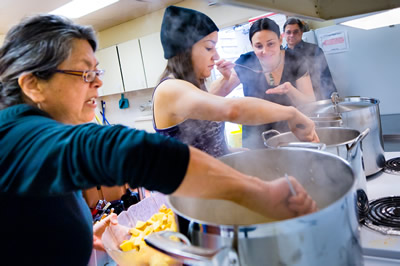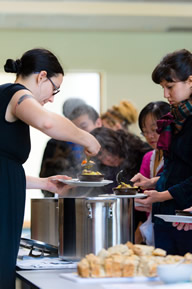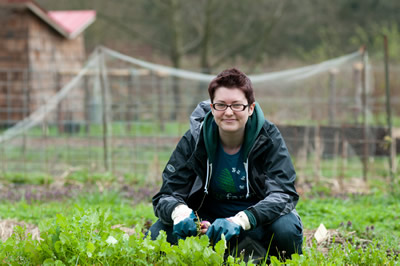At the February Feast Bowl meal, about 40 faculty, staff and students, who represented an array of cultures and UBC departments, gathered in Sty-Wet-Tan Hall at First Nations House of Learning to eat a home-cooked meal and enjoy the opportunity to speak with colleagues and friends they don’t see every day. Following a blessing by Dr. Richard Vedan, a professor in the School of Social Work, participants served themselves a meal of chilli, bannock and homemade jam, and roots and shoots salad with mugs of hot coffee and mint tea made from dried mint grown on the UBC Farm.
“From an Aboriginal perspective, holistic health is the foundation of wellness,” says Dr. Teresa Howell of the Institute for Aboriginal Health, and she says addressing health from a mental, emotional, physical, and spiritual perspective are vital components to the Feast Bowl.
The Feast Bowl cooking is done by volunteers, and meals always incorporate eating for heart health and diabetes prevention. A fall meal featured curried squash, and in the spring, there are plans for a meal focused on traditional protein sources such as buffalo.
Hannah Lewis, the Institute for Aboriginal Health Garden and Community Kitchen Coordinator, says that students from dietetics and nutrition have previously come to speak to the kitchen volunteers on an informal basis about nutrition and health and how it relates to food. Beginning at the next Feast Bowl meal, she is planning a more formal presentation series featuring elders from various nations and volunteers from the Wellness Centre, a health and wellness resource for UBC students located in the Student Union Building.
At the spring Feast Bowl, Musqueam elder Bonni Hanuse will speak about the importance of investing energy, prayer and spirit into cooking.
As part of the Focus on People strategy to develop a sustainable, healthy workplace, the Focus on People framework supports the Healthy Workplace Initiative Program (HWIP). The HWIP provides $100,000 in funding per year for UBC departments and units that wish to promote healthy behaviours. The goal of the program is to help reduce long-term and chronic disease, and to promote the health of UBC faculty and staff.
The request for funding to run the Feast Bowl community meal was approved in its entirety in the fall of 2010. Suzanne Jolly, Coordinator for Health Promotion Programs, says that the application from FNHL and IAH fit the criteria of the HWIP funding in several ways. The Feast Bowl was created to address Aboriginal health needs, which are often underserved by broader health initiatives, and also uses UBC resources such as the UBC Farm. Moreover, the meal is a way to bring together resources and experience from across the Aboriginal community such as traditional knowledge about food and medicine from elders in the community.
When the FNHL and IAH applied for the Healthy Workplace funding, they hoped that by cooking the Feast Bowl meals, attending the presentations and eating together as a community participants would increase their understanding of the food system, learn skills to grow their own food and medicine, begin to identify and use Indigenous plants, and connect this information and experience to their health and lifestyle.
Howell notes that some of the goals of the Feast Bowl meals are already being realized. In addition to building relationships with others who come to the meals, some attendees have decided to plant gardens at home because of their experience with the Feast Bowl.
A medicine-making workshop was held in the longhouse in conjunction with a previous Feast Bowl meal. The workshop was led by Alannah Young, a PhD student at UBC who is studying indigenous education and who has been growing medicines on the IAH plot at the UBC Farm, and Jeri Sparrow, an elder from Musqueam, who is involved in the Urban Aboriginal Community Kitchen Garden Project at the Farm. Lewis notes that almost all of the plants used during the workshop, including calendula, comfrey, yarrow, plantain and balsam, were grown at the IAH plot on the UBC Farm.
Lewis and her team are producing a newsletter for each Feast Bowl. The newsletters contain recipes from previous Feast Bowls, tips on growing food, cooking and eating healthily, special topics (such as cooking with children or eating to manage or prevent diabetes), and information on foods that are in season, including tips for growing and cooking it. A cookbook is in the works as well, with a planned release in the late summer or early fall.
Beyond the funding commitment from HWIP, the FNHL and IAH hope to continue with the Feast Bowl based on the success of the program and on available funding.
This story originally appeared in the 2010 Focus on People Annual Report. To learn more, take a look at the full report.


